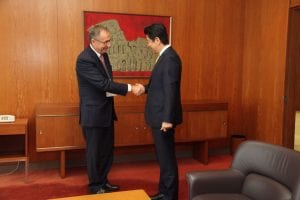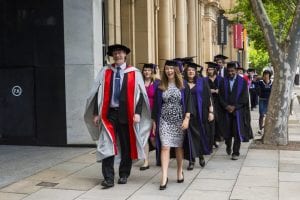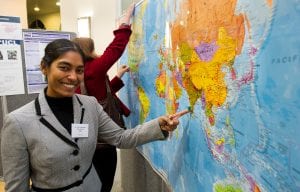What value is our Global Engagement Strategy adding?
By ucypnmb, on 23 January 2018
 In 2017, UCL academics delivered breakthrough research across a broad range of disciplines: from new insights into the health impacts of climate change, to the discovery of the world’s oldest fossil and most recently, the successful trial of a drug to reduce the deadly Huntington’s Disease protein. In all of these cases international collaborators played an important role.
In 2017, UCL academics delivered breakthrough research across a broad range of disciplines: from new insights into the health impacts of climate change, to the discovery of the world’s oldest fossil and most recently, the successful trial of a drug to reduce the deadly Huntington’s Disease protein. In all of these cases international collaborators played an important role.
Most, if not all of those collaborations would happen whether UCL had a Global Engagement Strategy or not. So, what value does having a strategy add, and how does the Global Engagement Office (which cost UCL £2.5m in 2016/17, only 0.2% of overall annual expenditure) support UCL’s academic mission?
UCL academics work with the best people in their field, irrespective of where they are in the world; I heard one academic colleague describe it as ‘ideas without borders’. And over the past five years, as UCL has grown, we’ve also doubled our international collaborations.
Bringing together different perspectives and diverse experience accelerates the process of discovery, so our mission in GEO is to support UCL academics to collaborate with others who share their curiosity, dedication to excellence and passion for knowledge. Here’s how we do it – please let me know if you find what we do is helpful by commenting on this blog.
Starting points, and frames of reference
UCL is a very ‘bottom up’ university: that’s why I consulted so widely during 2014 on the design for the new Global Engagement Strategy to deliver Principal Theme 6 of UCL 2034. Everything in it comes from what I heard our staff and students tell me about why and how UCL is a truly global university, not just in terms of our international rankings but also how we think and who we work with.
Strategy is about choice and direction: where do you want to be in 20 years’ time and how will you get there? If you have a clear strategy and a plan to implement it, you can evaluate your progress.
In short, not even UCL can do everything, everywhere: internationally, it makes sense to focus cross-institutional resources (staff time, programme funding) on a selected set of partners with whom we have shared interests and expertise in solving global challenges, and a high chance of achieving global impact. If we do that, we’ll raise UCL’s global profile. That’s desirable because it’ll help us attract and retain excellent staff, students and partners who want to work or study with us. It will also mean wasting less time when travelling in explaining that we’re from UCL – not UCLA.
Strategic focus emphatically doesn’t mean constraining academic freedom and creativity in any way. We derive our focus – particular countries, particular partners – by starting from UCL’s great strength in research and teaching: the constantly evolving stream of creative teaching, research enquiry, knowledge and ideas that spring from our intellectual freedom.
We look across UCL and gather data on existing patterns of successful international collaborations led by individual academics, departments or Faculties. We can then offer additional resource and expertise to help with these partnerships to enhance UCL’s teaching, research and global impact.
The kinds of practical things GEO does, and that our academic colleagues have told us they value, include: setting up and running seed-funding schemes; providing administrative support for inbound and outbound visits and events; offering country-specific knowledge (language, culture, political context, country-specific data); and raising the profile of UCL and its world-leading research through communications expertise. We also support follow up to visits and measure and evaluate progress. So, if you want to know what’s happened since you joined a UCL delegation visit to, say, the University of Toronto (UofT) last year, GEO can update you.
Seed-funding
We run a range of schemes, some available to support good ideas for any international activity anywhere in the world and some that are designed to widen or deepen specific partnerships such as with UofT and Peking University. In 2015-16, £180,000 worth of funding from GEO led to academics bringing in over £2m in external research grants. We’re waiting on the outcomes for 2016-17, and are expecting similar results.
Over three years, GEO has allocated around £500,000 to more than 400 UCL academics from over 80 departments. These academics went on to partner with 464 organisations in 79 countries worldwide.
Applications for this year’s Global Engagement Funds will open on 19 March and close on Thursday 17 May. You can find more information about the scheme, and other schemes to support international collaboration on our website.
Country-specific expertise
Members of GEO have collectively 192 years of experience in the HE sector, especially international partnership working. What all of us have in common is international experience and expertise, speaking 12 different languages, and having lived in 35 countries across the world. This means we can offer useful cultural insights, such as running a session on Chinese business etiquette, which is something our Senior Partnerships Manager (East Asia) Lizzy Deacon did ahead of a recent delegation visit to Beijing.
The team’s European knowledge and expertise has proven particularly useful, with our Senior Partnerships Manager (Europe) Conor Rickford acting as Secretary to Provost’s Brexit Mitigation Group. One of the actions to come out of this group is a new Cities Scheme to start in Europe: we’ll be able to share more news about this with you next term.
Of course, we’re also on hand to help with MOUs with international partners, and provide tools and templates to support your international collaborations as well as information on specific countries and useful local contacts. You can find a Partnerships Toolkit and contact details for the Partnerships Team on our website.
Administrative support
A substantial part of what GEO does is manage inbound and outbound delegation visits, taking care of everything from scheduling meetings and preparing detailed briefing documents for delegates, to speech-writing, booking flights and accommodation and arranging media interviews.
This academic year, GEO has hosted six inbound visits and led or co-led two outbound visits to Japan and China. The next will be a small delegation visit to Singapore in March. Visits are of course not an end in themselves, just as being invited as a keynote speaker isn’t an end itself, but both reflects and enhances individual academic reputations. Well-focused and organised visits, that are carefully followed up, can do the same for institutional reputations.
Japan delegation visit
GEO led the organisation of the Provost’s recent visit to Japan, working closely with colleagues in the Office of the Vice-Provost Development (OVPD). The visit aimed to build on the historical links between UCL and Japan, to further explore opportunities for partnership and philanthropic investment, as well as strengthen ties with our Japan-based alumni.
 The Provost’s hectic schedule included meetings with the Prime Minister of Japan, the British Ambassador to Japan, the universities of Tokyo, Tohoku, Kyoto and Osaka and leading companies including Eisai and Hamamatsu Photonics, (who are both close industrial partners and significant donors to UCL). He met (for the second time) the Governor of Fukushima Prefecture. He also attended and spoke at the Science and Technology in Society forum in Kyoto, and a UCL alumni event was organised by the OVPD at the British Ambassador’s residence during the visit.
The Provost’s hectic schedule included meetings with the Prime Minister of Japan, the British Ambassador to Japan, the universities of Tokyo, Tohoku, Kyoto and Osaka and leading companies including Eisai and Hamamatsu Photonics, (who are both close industrial partners and significant donors to UCL). He met (for the second time) the Governor of Fukushima Prefecture. He also attended and spoke at the Science and Technology in Society forum in Kyoto, and a UCL alumni event was organised by the OVPD at the British Ambassador’s residence during the visit.
Outside the Provost’s visit programme, GEO organised separate programmes for each of the UCL academics in the delegation, who visited potential and existing academic and business contacts and delivered lectures and workshops.
The trip was a resounding success. From a GEO perspective, we were able to:
- Identify and progress institutional partnerships: Meetings during the visit directly led to rapid follow-up visits from four Japanese universities, which GEO hosted at UCL in November and December. Osaka University and Tohoku University have emerged as key institutional-level partners, with whom we not only have considerable collaborations but a common vision, many shared values and an appetite to strengthen our partnership. This development opens up a number of possibilities including funding for increased collaboration.

- Help individual academics forge new links with Japanese universities, businesses and research institutes. Some concrete next steps are in train. For example, Professor Claudia Mauri, Vice Dean (International) for Medical Sciences and Professor of Immunology agreed a range of collaborative ideas (including setting up joint PhDs) with Osaka’s world-renowned research centre in Immunology.
- Raise UCL’s profile: the meeting with the Prime Minister; high profile speaking engagements and media coverage secured by GEO generated 94 news articles, with a combined reach of 70m people. As a result, the average number of monthly visitors to the UCL website from Japan increased by 69%. This is a good start to our profile-raising work in Japan, which GEO will continue to coordinate across UCL, working with VP Offices as well as Communications and Marketing.
Thank you to everyone who contributed to making this such a successful trip, and in particular the academics who gave their time so generously: Prof Gill Livingston (Division of Psychiatry) Dr Ed Wild (Institute of Neurology) Prof Nick Tyler (Civil, Environmental and Geomatic Engineering), Prof Peter Sammonds (Institute for Risk and Disaster Reduction), Prof Claudia Mauri (Division of Medicine) and in particular our UCL ambassador for Japan, Prof Shin-Ichi Ohnuma (Institute of Ophthalmology). Professor Ohnuma continues to work enthusiastically to strengthen ties between UCL and Japan. I’m delighted to say that his efforts have been recognised by the Japanese Embassy who, earlier this month, awarded him the Foreign Minister’s Commendation for his contribution to Japan-UK academic and educational cooperation. This is a thoroughly well-earned recognition. Congratulations!
Regional news in brief
East Asia:
- The Provost led a delegation in visiting Beijing for a PKU meeting and graduation ceremony late last year.
- As part of the deep strategic partnership with Peking University (PKU), UCL is inviting applications for the Peking University Strategic Partner Funds to support activities involving UCL and PKU collaborators. Up to £10,000 is available per project/initiative and proposals will be assessed by a selection panel, chaired by the Pro-Vice-Provost (East Asia). Applications are now open and close at midnight on 28 March 2018.
Europe:
- Ten UCL academics have been awarded the newly-launched Rome Regional Partnership Funds. Part of a new series of region-specific funds, the diverse group of winning projects will foster new partnerships or further develop existing links.
- An agreement is being finalised with Paris Sciences et Lettres (PSL), the university group containing the École Normale Supérieure and l’École des Hautes Etudes and Sciences Sociales. Supported by the Institute of Advanced Studies, it will provide joint funding for three new small research groups, focusing on interlinked research priorities that are of particular relevance to British and French society today.
- A delegation led by the Provost, and including Prof Alan Thompson (Dean of Brain Sciences), Prof David Lomas (Vice-Provost Health) and Dame Nicola Brewer (Vice-Provost International) will visit Leuven, Belgium on 24 January. They will meet staff and students from KU Leuven to discuss potential UCL co-operation.
Australia & SE Asia
- UCL Australia celebrated its final graduation and the move to the University of South Australia campus.

- Prof Nick Phelps, Prof Claudio Stern and Dame Nicola Brewer (Vice-Provost International) will visit Singapore in March, for discussions with the National University of Singapore.
North and Latin America
- A delegation led by the President of the University of Toronto (UoT) visited UCL this month to discuss continuing collaborations in the areas of health and neuroscience, following the allocation of joint seed funding in 2017.
Africa and ME
- UCL Qatar has collaborated with the MET New York and Qatar Museums on extensive object analysis, using the expertise and equipment in UCL Qatar Labs. Conservators from the MET visited UCL Qatar in early January to examine over 80 objects, which will be displayed at an exhibition taking place at the MET.

- Last month UCL Qatar joined forces with the British Council and various partner organisations in a series of public events exploring Doha’s rich cultural heritage.
- The Provost will be making his first UCL visit to the Africa Health Research Institute (AHRI) in November 2018. AHRI is a multidisciplinary, independent research institute based across two sites in the province of KwaZulu-Natal, South Africa that is committed to working towards the elimination of HIV and TB.
South Asia
- The ‘Difficult Dialogues’ summit is set to take place 9-11 February in Goa. A partnership between UCL, Goa University and the International Centre Goa, UCL academics will join other leading thinkers in a series of panel discussions on the topic of gender equality.
- An inward visit by the Indian Institute of Astrophysics, Bengaluru, to London is planned from 19-23 March. Dr P Sreekumar, Director of the Astrophysics Institute and a member of ISRO, will bring a delegation comprising of senior and junior officials for joint research activities in astronomy with UCL.
Images: Celebrating Global Enagagement event (credit: Kirsten Holst); Dr John Hurst with partners in Peru; Celebrating Global Enagagement event (credit: Kirsten Holst); Provost-led delegation to Japan, September 2017; Osaka University inward delegation visit, November 2017; UCL Australia graduation ceremony December 2017; Professor Rob Carter, UCL Qatar public lecture
 Close
Close



